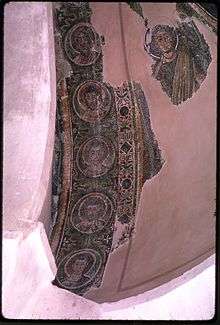Lythrangomi
| Lythrangomi | |
|---|---|
| Λυθράγκωμη (Greek) Boltaşlı (Turkish) | |
 Lythrangomi Location in Cyprus | |
| Coordinates: 35°28′36″N 34°10′1″E / 35.47667°N 34.16694°ECoordinates: 35°28′36″N 34°10′1″E / 35.47667°N 34.16694°E | |
| Country |
|
| • District | Famagusta District |
| Country (controlled by) |
|
| • District | İskele District |
| Government | |
| • Mukhtar | Sefer Mani |
| Population (2011)[1] | |
| • Total | 228 |
| Time zone | EET (UTC+2) |
| • Summer (DST) | EEST (UTC+3) |
Lythrangomi (Greek: Λυθράγκωμη) or Boltaşlı (in Turkish) is a village in the Famagusta District of Cyprus, located on the Karpass Peninsula east of Leonarisso. It is under the de facto control of Northern Cyprus.
Panagia Kanakaria

The church of Panagia Kanakaria (Παναγία Κανακαριά) stands to the west of the settlement beside the road toward Famagusta. It is a building of many periods, with the main apse being a remnant of an early Byzantine basilica. The original church, with a wooden roof, perhaps dated to the fifth century, but was subsequently rebuilt as a three-aisled basilica with apsidal east ends, vaults and a dome, probably in the eleventh century. The narthex on the west was added later, likely in the twelfth century.[2] The small bell-tower belongs to the late nineteenth century.
In the conch of the central apse there was a mosaic of the Virgin Mary enthroned, holding Christ on her lap. On each side were angels, but only that on the left side was preserved in the middle part of the 20th century. Round the outer edge of the apse were saints, each with a halo in a medallion and surrounded with acanthus leaves. The exact date of the mosaics is debated, but they are generally thought to belong to the sixth century and be coeval with work in Ravenna.

The other parts of the church carry fragments of fresco paintings of various periods down to at least the sixteenth century. Stylianou described the paintings as being "of interest only to specialists owing to their poor condition." The best preserved is part of an Annunciation on the west face of the transverse arch, dating to about 1500 and showing Italian influence.[3]

The mosaics in the apse were stolen from the church after 1975 and some sold on the art market in the USA, an event reported in the New York Times (21 July 1989) and other papers. After a protracted legal battle, ownership of the mosaics was recognised and they were returned to Cyprus. They are currently on display in the Byzantine Museum, Nicosia.[4] However, some parts of the mosaics are still missing.[5]
External links
Inventory of Byzantine Churches on Cyprus http://ibcc.dighum.kcl.ac.uk/entries/b0070.html
References
| Wikimedia Commons has media related to Panagia Kanakaria. |
- ↑ KKTC 2011 Nüfus ve Konut Sayımı [Northern Cyprus 2011 Population and Housing Census] (PDF), Northern Cyprus State Planning Organization, 6 August 2013
- ↑ Megaw, A. H. S., and Ernest J. W. Hawkins, The Church of the Panagia Kanakariá at Lythrankomi in Cyprus: Its Mosaics and Frescoes (Washington: Dumbarton Oaks Center for Byzantine Studies, Trustees for Harvard University, 1977); Stylianou, A., and J. Stylianou, The Painted Churches of Cyprus (Cyprus: Research Centre, Greek Communal Chamber, 1964): 23.
- ↑ Stylianou, A., and J. Stylianou, The Painted Churches of Cyprus: Treasures of Byzantine Art (London: Trigraph for the A.G. Leventis Foundation, 1985): 47.
- ↑ An illustrated account in Jannic Durand, Dorota Giovannoni, and Dimitra Mastoraki, Chypre: entre Byzance et l'Occident, IVe - XVIe siècle (Paris, 2012): 8-9. Illustrations can also be seen here: http://www.diakonima.gr/2010/06/15/church-of-panagia-kanakaria-lythrangomi/ Retrieved June, 2016
- ↑ An online account with further illustrations is given by the Department of Antiquities here: http://www.mcw.gov.cy/mcw/DA/DA.nsf/All/5C63072411078AB9C22572750055D67D Retrieved June 2016

